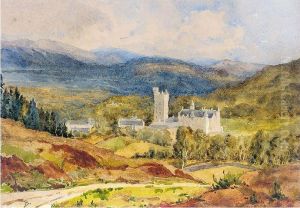Princess Beatrice Paintings
Princess Beatrice of the United Kingdom was born on April 14, 1857, as the youngest child of Queen Victoria and Prince Albert. Unlike the artists typically discussed for their contributions to the visual arts or literature, Princess Beatrice's life is notable for her role within the royal family and her contributions to preserving her mother's legacy. Although not an artist in the conventional sense, her life was deeply intertwined with the cultural and historical fabric of her time, making her a figure of interest in the broader context of art history, particularly for her involvement in literary and archival endeavors.
After the death of her father in 1861, Beatrice became Queen Victoria's unofficial secretary, a role that significantly influenced her life and duties. She accompanied her mother almost everywhere and was deeply involved in the queen's daily affairs and correspondence. Her dedication to her mother was such that she delayed her own marriage, eventually marrying Prince Henry of Battenberg in 1885, only after securing her mother's agreement that she and her husband would continue to live with and attend to the queen.
Following Queen Victoria's death in 1901, Princess Beatrice's most significant contribution to history and the arts was her painstaking work on her mother's diaries. Queen Victoria had been an avid diarist, documenting her thoughts and experiences from a young age. Beatrice took on the monumental task of transcribing and editing these diaries for publication, a process that involved copying tens of thousands of pages by hand and, controversially, destroying the originals to protect her mother's privacy. This act has been both praised for preserving Victoria's legacy and criticized for the loss of historical documents.
Princess Beatrice's later years were marked by her dedication to her family and various charitable works. She lived through two world wars, witnessing significant changes in the British monarchy and society. Her life offered a unique bridge between the Victorian era and the modern world, reflecting the shifts in art, culture, and politics that occurred over her long lifetime. She died on October 26, 1944, leaving behind a complex legacy shaped by her roles as a daughter, mother, and guardian of her family's history.
Though not an artist in the traditional sense, Princess Beatrice's life and work offer valuable insights into the cultural and historical contexts of the Victorian period and early 20th century. Her efforts in preserving Queen Victoria's diaries have made a lasting impact on the historical and cultural understanding of the period, showcasing the personal thoughts and experiences of one of Britain's longest-reigning monarchs.
